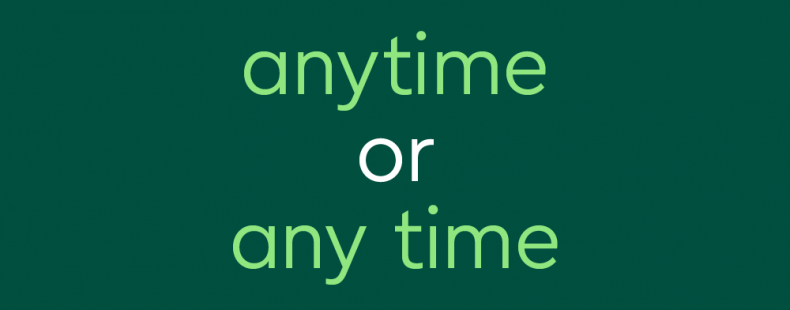Anytime or any time? The two tend to be used in the same exact contexts, but that one little space can make a lot of grammatical difference.
In this article, we’ll discuss how and when to use each form and explain which one is an adverb and why. Don’t know what that means? Read on to find out!
⚡ Quick summary
Any time is a noun phrase that is commonly used after the preposition at (Please call at any time) or by itself (Any time you choose for the appointment is fine). Anytime is an adverb that can replace (or be replaced with) “at any time” or “whenever,” as in Please call anytime or They won’t arrive anytime soon. The phrase that means “you’re welcome” is any time.
Anytime vs. any time
Any time is a common and straightforward noun phrase that means exactly what it seems like it does based on its component parts. Importantly, it functions as a noun, often in prepositional phrases with the preposition at, as in Feel free to call at any time. But it also commonly appears by itself (without at), as in Any time is a good time for cake.
Anytime is an adverb meaning “at any time; regardless of hour, date, etc.; whenever.” Because it’s an adverb, it modifies a verb, as in Feel free to call anytime or I won’t finish anytime soon.
A more recent use of anytime is as an informal adjective that means something like “suitable for any time or occasion.” It’s typically used in a prepositive position (meaning it comes before the noun it modifies) and in contrast with a similar grammatical use of sometimes, as in Cookies are a sometimes snack, but carrots are an anytime snack.
The phrase any time is also used as an informal response to a person expressing thanks, similar to you’re welcome. For example, when someone thanks you for helping them, you might respond by saying Any time! Glad to help.
In English, it’s pretty common for two-word noun phrases to be pushed together for use as other parts of speech. For example, the noun phrase every day becomes the adjective everyday. Other examples are so common that you might not even realize they were formed from noun phrases, such as sometimes. When a term is spelled as two words as opposed to one, it’s often a clue that it’s used as a noun.
Anytime or any time: when to use each one
Anytime can be used in the same places that you can use another adverb, especially whenever. You can often test whether it’s appropriate to use anytime by seeing if you can substitute whenever or at any time.
In contrast, if the term follows the preposition at, it should be the noun phrase any time. When any time is used with at, it can be followed by extra information that specifies the time (at any time of day; at any time of night; at any time of year). This is another sign that you want any time.
Similarly, if it’s the subject of the sentence, it should be any time (as in Any time is a good time for cake). In other words, any time is always used as a noun.
Remember, anytime essentially exists to be used in place of the phrase at any time. Ultimately, most sentences can be rewritten to use one or the other and still have the same exact meaning. When in doubt, build the sentence around the phrase at any time.
Make time for this quiz on when to use any time and anytime.
Examples of anytime and any time used in a sentence
- If you need help, call this number anytime.
- If you need help, call this number at any time.
- You can’t just show up anytime—you need an appointment.
- You can’t just show up at any time—you need an appointment.
- The flight is expected to land anytime now.
- The flight is expected to land at any time now.
- You may hear kids playing at any time of day now that summer vacation has started.
- You may hear kids playing anytime now that summer vacation has started.
- Anytime you’re around, call me and we’ll hang out.
- Any time is a good time for tea.
- I can drink tea anytime.
- Anytime I see Kate, she’s reading a book.
- Dave: “Thanks for helping me with the repairs.” Sarah: “Any time! I enjoy it.”














